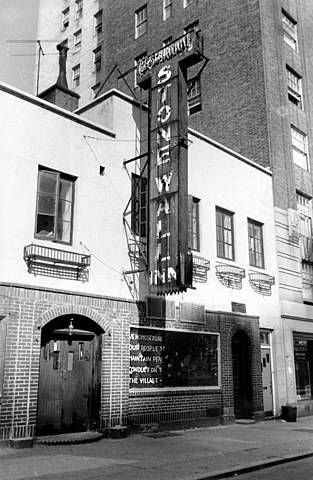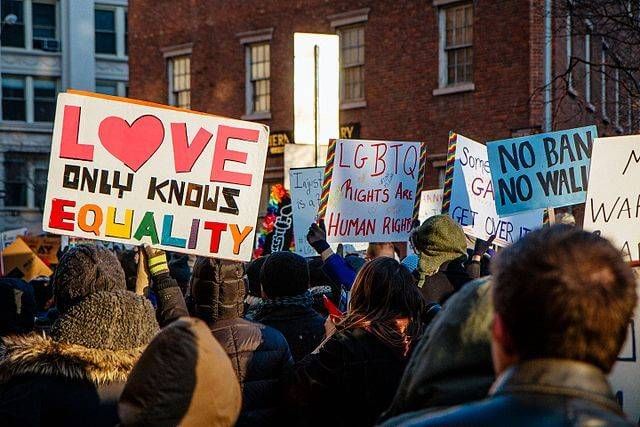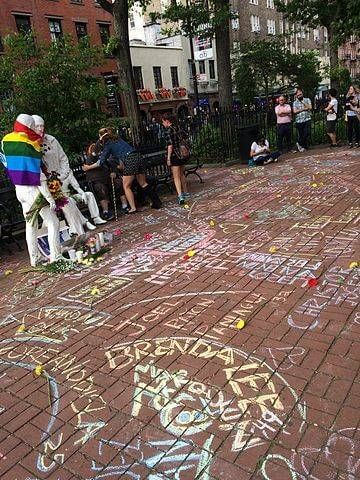What Do the Stonewall Riots Mean to MN's LGBTQ+ Communities?
On June 14, 2019, Mia's "Stonewall at 50" event commemorated the 50th anniversary and Pride Month. While there, TPT producers asked folks what the Stonewall riots' legacy means to them in the present moment. We got a wide range of responses, but a central theme emerged: Stonewall was a defining moment for gay liberation in the United States.
Less than a decade after the McCarthy era's Lavender Scare ended, the law in 1969 still actively criminalized homosexuality. In the late '60s, you could still be arrested for being gay, lesbian, bisexual or transgender. Gay men and women could not be served alcohol in public in New York City due to liquor laws that deemed gatherings of homosexuals to be "disorderly." Most gay clubs required boarded-up windows, hidden entrances or whispered passcodes to protect their patrons. And yet, despite every rule dictating they could not be who they were, they found one another.

Then, on June 28, 1969, LGBTQ+ folks gathered for just another night out in Greenwich Village – a drink, flirtation and music with other people like them. And then, a raid began. Like so many other raids across the country, the police barged in to the mafia-owned Stonewall Inn and began roughing up customers. Instead of fleeing to safety, this time several bar-goers chose to fight. They chose to stand up and reject the idea that their lives were less-than. The stand-off escalated. Bricks were thrown and police clubs turned back on officers. For many that night, this was a fight for life, itself. The early-morning Stonewall riot led to five days of New York City protests on Christopher Street. Activists demanded police brutality against the LGBTQ+ community stop immediately.
“She sat there with her legs crossed, the lashes mascara-coated, eyes beating like the wings of a hummingbird. She was angry. She was so upset she hadn’t bothered to shave. A day-old stubble was beginning to push through the pancake makeup. She was a he. A queen of Christopher street.” - Sunday News, 1969
One of Minneapolis's queer historians, Rebecca Lawrence of Telling Queer History, pointed out that so many people in the LGBTQ+ community don't know their history because it's been systematically erased over time. "I'm hopeful that, if we learn our history, then we can share it and teach it to others."
Other event attendees stressed the importance of remembering the full cadre of people who fought in the Stonewall riot. "We would call them transgender today, but they referred to themselves as drag queens, transvesdykes and trannies," said oral historian and Minneapolis City Council member Andrea Jenkins.

Honoring Marsha P. Johnson and Sylvia Rivera for their role in the riots has become a critical focus of Stonewall's 50th anniversary. Johnson and Rivera are two of the best-known names from that morning of turmoil - and earlier this month, New York City officials announced plans to erect a memorial in their honor, the first in the world to celebrate the contributions of transgender people. Tireless activists, drag queens and close friends, Johnson and Rivera tried to move gay liberation forward in a way that included the trans community's unique struggles for acceptance and recognition.
"I owe everything to the transgender women of color who made it possible for me to be who I am," Katie Youmans told us. A recent transplant to the Twin Cities, Youmans uses they/them pronouns and recently left a conservative community in the southern United States. "They were extremely brave in a time when it was scary just to be."
Fifty years later, transgender folks continue to fight for their basic rights and safety. While the Trump administration seeks to limit the few rights they have been granted by federal and state laws, there are also rising reports of brutal violence regularly perpetrated against transgender people, especially transgender women of color. "With violence against transgender people at an all-time high and rising, national media coverage is severely lacking. In order for people to be aware of the horrific violence affecting the community, the public needs to know it is happening," GLAAD's website states, calling on media outlets to communicate about the deadly realities faced by transgender people.
“Even in our own community there are people who support trans people but are not for trans people." - Tygra
When talking about human progress and social justice, Jenkins noted that she believes "the queer community still needs to recognize, acknowledge and lift up the voices, the leadership, the power of the transgender community. Particularly trans women of color... We know since 2013, 168 trans women of color have been murdered in the U.S. And 6 of those have occurred within the last two weeks in 2019."

Fellow trans activist and drag performer Tygra echoed the Councilwoman's concern for the acceptance and liberation of transgender people in society. "Even in our own community, there are people who support trans people but are not for trans people. When we say 'equal rights,' we don't mean less for some and more for all: We mean across the board, across the spectrum, everyone gets to eat at the table because right now trans people are excluded."
Like most Pride Month festivities, the Mia event honoring Stonewall was full of joy and celebration. But this year's 50th anniversary of the riots also brought a sense of gravity to the event since it served as a memorial on behalf of the historic uprising and a chance to reflect upon the contemporary struggles the LGBTQ+ community faces. As Kelsey Bruso told us, "Stonewall is paradoxical because the event, itself, was generated by drag queens and people who are trans, and they are still marginalized today. There still is so much more work to do to help them be fully included in today's society."
